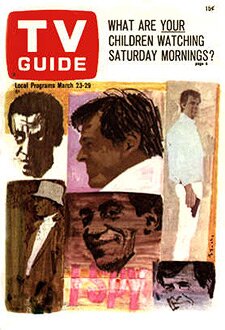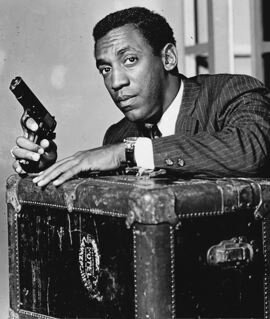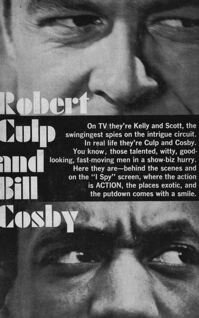You are hereMagazines 1990-1999 / Television Shows / I Spy
I Spy

WONDERFULNESS
By TOM SOTER
from VIDEO, 1993
I Spy
1965/1966. Robert Culp, Bill Cosby, Gene Hackman, Carroll O'Connor; dir. Richard Sarafian, Earl Bellamy, Robert Butler. Two tapes, 100 min. each; $19.95 each. United American Video.
Long before Dr. Cliff Huxtable and those Jello commercials made Bill Cosby a multi-millionaire, he was appearing as Alexander Scott, partner to Kelly Robinson (Robert Culp) in the groundbreaking spy series I Spy. The show, about two globe-trotting CIA men, is unique among the 1960s crop of James Bond TV clones: it was actually filmed in the foreign locations the agents visited and it paired a black and a white man as equal partners.
Besides that, the series is appealing for its fast-paced action and clever stories, and the easy rapport and insolent cool of Culp and Cosby, who often improvised their rambling exchanges. "Life is good," says Culp in one. "It's better than that, man," replies Cosby. "On a day like today there's a wonderfulness from the sky and the sea and the people that kisses you all over the neck and nose." Culp: "Name another day when such a report to the Pentagon was written by two fine American spies."
The four episodes represented here, primarily from the series' first season, are hardly representative of the show's humor and clever plotting or even its globe-hopping, since three take place in Mexico. Nonetheless, there is intrigue, beautiful photography, the snazzy I Spy theme tune, and the chance – in "It's All Done With Mirrors" – to see Archie Bunker (Carroll O'Connor) as a Communist agent. Now that's a trip, man.
The tapes are available by mail order from United American Video (803-548-7300), which has also released classic TV episodes of Hill Street Blues, Lou Grant, The White Shadow, and The MaryTyler Moore Show.
NOTES FOR AN ARTICLE
I would often write a longer version of the published article and then cut it down. Here are my notes to the review shown above. Some of the material was drawn from an earlier article I had written about TV spies in 1984.
 Bill Cosby
Bill Cosby
Part spy story, part travelogue, I Spy is unique among the 1960s crop of James Bond TV clones for a number of reasons: unlike The Man from U.N.C.L.E. or Secret Agent, the series actually filmed its episodes in the exotic locations the heroes visited (not a redressed back lot). That gave the show a picturesque quality that was complemented by the other unique aspect: the first-time TV pairing of a black man and a white man as equal partners. As the duo – two CIA agents masquerading as a tennis star and his trainer – Robert Culp and Bill Cosby have a charming, improvisational rapport that makes them the height of cool.
The four episodes represented on these two tapes come primarily from the series' first season – and are hardly representative of the show's smart–aleck humor and clever plotting, or even its globe-hopping, since three of the four shows take place in Mexico.
A landmark for its use of a black man as a co-star, the show featured Robert Culp as Kelly Robinson, an international tennis champion, and Bill Cosby as Alexander Scott, his trainer. The two men roam the world playing tennis – but are really agents on
missions for the CIA.
Besides being a well-produced travelogue (shot on location), the show is fun for its characterizations. Robinson and Scott have amusing exchanges on everything from Scotty's boyhood in Philadelphia to Robinson's feelings about life in the spy business; they have a nice camaraderie that seems real.
"Life is good," says Culp in one exchange.
"It's better than that, man," replies Cosby. "On a day like today there's a wonderfulness from the sky and the sea and the people that kisses you all over the neck and nose."
Culp: "Name another day when such a report to the Pentagon was written by two fine American spies."
But the overall tone of the show is serious. Humor worked in between the cracks, as Robinson and Scott defuse tense situations with jokes. Scott is a Rhodes Scholar who speaks many languages (one of the realistic touches of the series is having foreigners speaking their own languages to each other, not accented English as some series preferred). Robinson is intelligent, athletic, and laid back. Culp and Cosby play their roles with an insolent cool, which they drop as soon as action beckons. For the duo, demeanor is a mask. Spying is necessary, but dangerous. The only way to do it is by keeping a humorous perspective, depending on their wits and their friendship.
"Prejudice is based on ignorance," Cosby noted in 1967. "Many people have preconceived ideas about Negroes. On I Spy, they've seen I'm an everyman. The fact that I'm colored is as relevant to the role as being fat, tall, or pock–marked might The Avengers≤ I Spy helped break discriminatory barriers by ignoring them. Cosby won three Emmy Awards for his performance.
The series is a story of companionship, quite unlike the Bond movies in that respect. It underlines the need for working together to solve unpleasant problems. "Kelly and Scott are equals," said Ed Goodgold, who wrote a study of the series. "If a silly question has to be asked or a silly mistake made, both are capable of making it. Neither member of the team is infallible."
The series' best qualities are encapsulated in "Home to Judgement," a third season episode which finds the agents hiding out at Kelly's uncle and aunt's, seeking shelter from a nameless, faceless foe. The episode shows the serious, dangerous quality of the spy's life: humor is not a luxury, it is a defense. The world can be ugly.
This realism is emphasized by Fouad Said's inventive photography, which often has a handheld, cinema verite look. Fights are violent, jarring, with closeups, quick cutting, and often no music. Even the opening credits come on suddenly, without the normal three©second pause between pre-credits sequence and titles. You are thrust into the story much as the spy is thrust into a mission. It gives the series a kinetic, frenzied realism from the beginning, counterpointed by the low-key Culp and Cosby.
The best is probably "Happy Birthday, Everybody," which features Gene Hackman as a lunatic demolitions expert and Jim (Mr. Magoo) Backus as his target. There's also "It's All Done With Mirrors," which finds Carroll (Archie Bunker) O'Connor as a communist expert in brainwashing.
